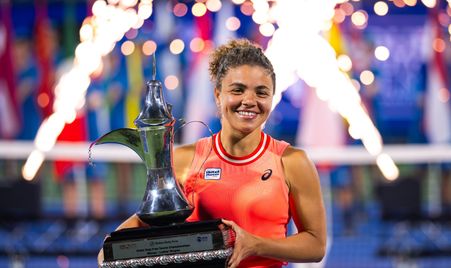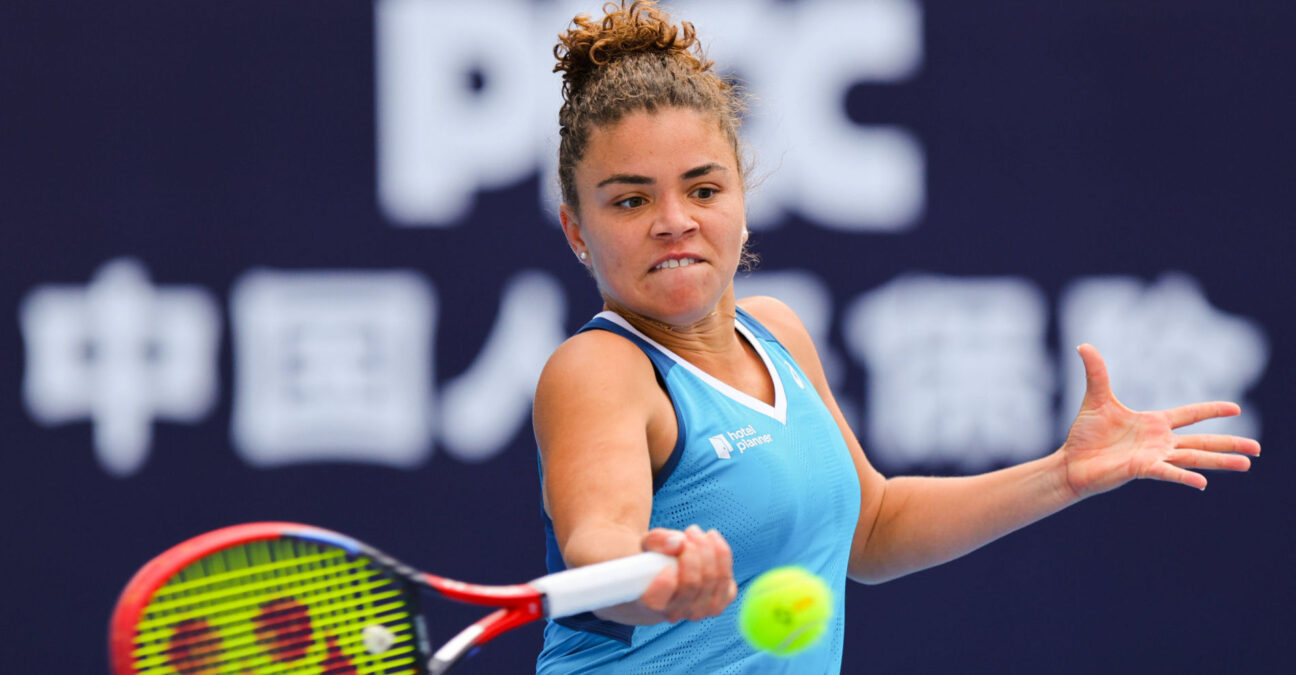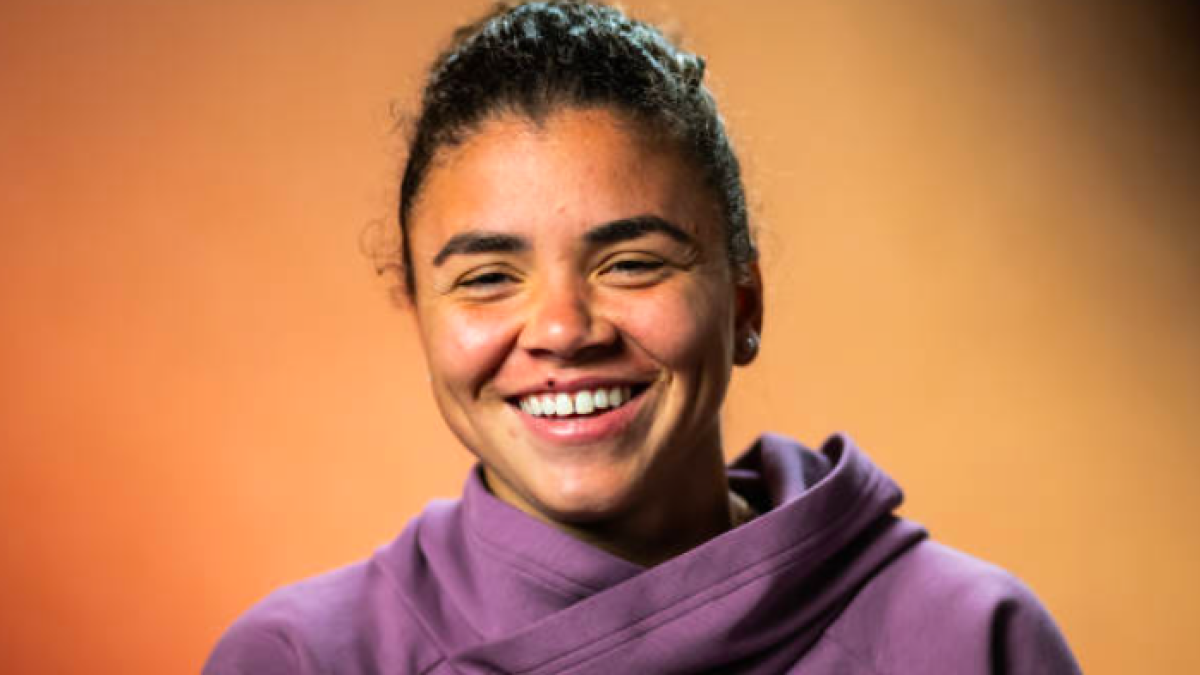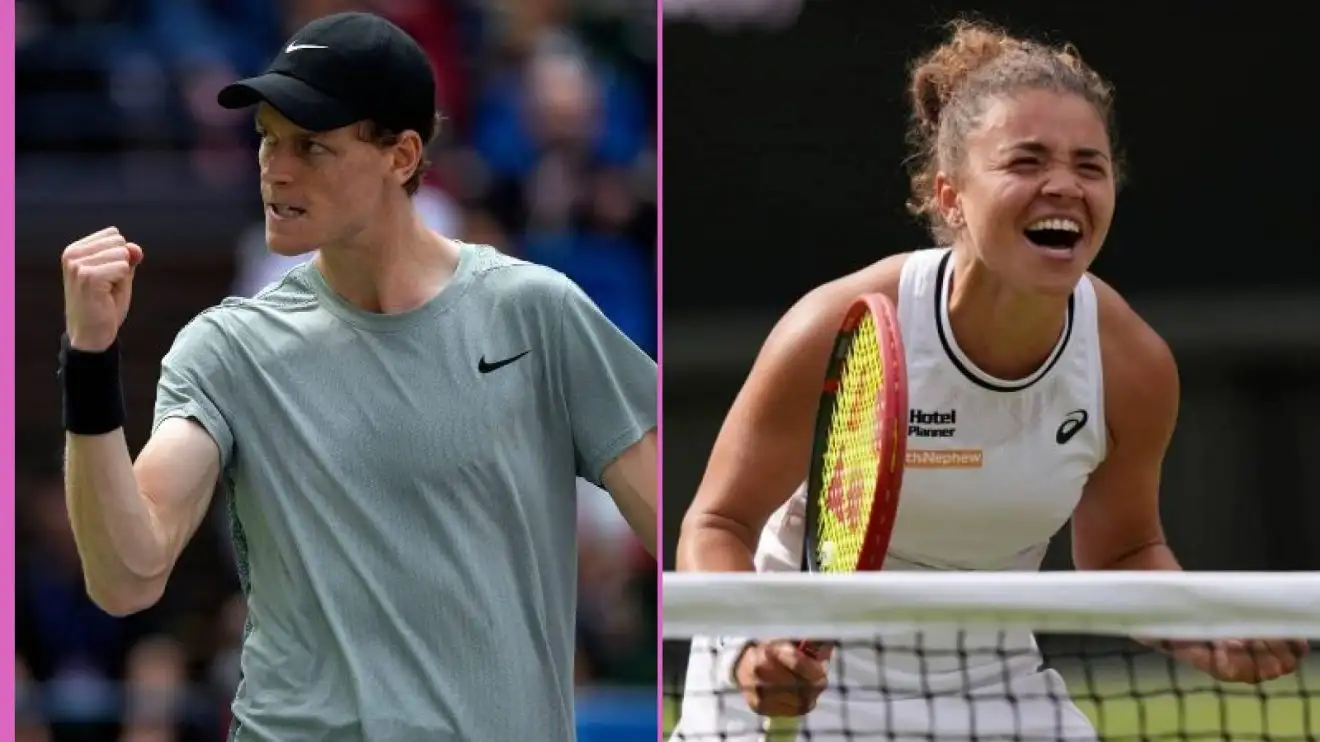‘Now I Dream of Paris 2024’: Tennis Player Jasmine Paolini on Her Fairytale Season
“Dreaming is the most important thing in life.” This has been Italian tennis player Jasmine Paolini’s mantra ever since her father, Ugo, handed her her first racket at the age of five. Paolini, 28, lost the 2024 Wimbledon women’s singles final to Czech player Barbora Krejčíková on Saturday. But despite the result, it marked a historic moment in Italian tennis history: no Italian female athlete before Paolini had ever advanced so far at that major.
It was a sensational, legendary match for Paolini—and no fluke. The proof was in her three-hour semifinal against Croatian Donna Vekić: Paolini won from behind, bending several times but never breaking.
The Wimbledon crowd will forever remember every one of her winning shots, and her shout—“Forza!”—was nothing less than the roar of a proud and fearless spirit, one who never stops dreaming. Paolini made up for what she lacks in height (she is five-foot-three) with heart, grit, and an impressive mental resilience, even with her teary-eyed parents and her younger brother, William (also a tennis player), watching from her box.
It’s impossible not to fall in love with her, with that mask of tension and its myriad expressions—from fierce gazes in the heat of competition to regretful looks for missed shots—that melts into a beautiful and contagious smile at the moment of victory.
There is no doubt that 2024 is a special, unforgettable year for Paolini: just a month before Wimbledon, she also reached the singles final at the French Open, a feat that no woman has accomplished in a single season since Serena Williams in 2016. Under the guidance of her coach Renzo Furlan, Paolini—who grew up between Bagni di Lucca, in Tuscany, and Łódź, Poland (the hometown of her mother, Jacqueline, who is half Polish and half Ghanaian)—has shown the world her worth, not only as a tennis player capable of breaking into the top 10 in the world (she is currently seventh in the WTA rankings, but likely to be fifth on Monday, July 15), but as a courageous woman who never gives up.
After all, sports (and in this case, tennis) are like life. And every day, you have to play the game just like Jasmine Paolini does.
Vogue: Jasmine, what memories will you have of this final?
Jasmine Paolini: I will have many memories. Unfortunately, the first thing that comes to mind is that I lost. But if I stop to reflect, I will always carry the emotion of playing on Centre Court, with such a warm-hearted audience.
The audience loved you!
Yes, and it was truly incredible to play such a match, such an important final, with all the stands full. The challenge was tough, I lost, but I have to try to see the positive side. Making it to play such an important match was something positive, undoubtedly.
Your experience at Wimbledon was still a victory for you and for Italian tennis. How are you approaching the Olympics?
Wimbledon was definitely a positive tournament—there’s a bit of regret for this lost final, but I have to try to be happy for these last two weeks that were wonderful. Now I’ll relax for a couple of days and then I’ll immediately try to readjust to clay again to arrive at my best for the Olympics.
Are they a goal for you?
Absolutely, yes, they are an important goal. They come once every four years, so I will put in maximum effort to try to do well, even though it won’t be easy. And then every tournament is different from the other. The important thing is to always have the desire to fight on every point, always trying to bring out the best.
Just over a month ago you were playing the Roland-Garros final in Paris…
In Paris, it was a very positive two weeks. But now I am totally focused on the present, because that’s how I concentrate, always preparing for the next tournament as best as I can. Now in my mind are the Olympics: That’s my goal. And I can’t wait to get back into the game.
“Jasmine, you’re too short to reach the highest level.” How many times have you heard these words?
Actually, I haven’t heard them very often. Those close to me have never placed this limit on me. Surely, if I had been a few centimeters taller, maybe it would have helped. But who knows? Honestly, I’m not dwelling on that right now, am I? I focus on playing with the weapons I have at my disposal.
Now that you’re ranked number 7 in the world, how satisfying is it?
It’s a great satisfaction, even though I don’t see it as a personal revenge. I don’t feel those kinds of sentiments or sensations.
You’ve made up for your lack of height with significant agility and power in your legs. Can you tell us how you’ve worked on your physical conditioning and technique to reach such heights?
Yes, to achieve these results, there has been continuous work both in terms of technique and physical training. The most important thing is to maintain consistency in the program with the athletic trainer, even during tournaments. I try to stick to it as much as possible because I believe it’s something that needs to be done every day. And of course, the technical aspect is crucial too: besides my coach [Renzo Furlan], Danilo Pizzorno, who is a video analyst, also contributes. Together, as a team, we strive every day to add one brick at a time, with the goal of improving every aspect.
First and foremost, though, there’s the mindset. How do you train mentally? How much have you been able to improve this aspect over time?
In the past, I’ve worked with psychologists, and mental training is definitely something I want to focus on again soon, because I think it’s very important. Above all, I’m convinced that knowing oneself better really helps improve performance on the court.
You’re an example for the next generation of aspiring tennis players. What message would you like to send them?
The message I would like to convey is to have fun, because that’s the most important thing. You must enjoy and have fun with what you do. It must be a true passion. But I also have another message…
What is it?
One should never be afraid to dream.
Who has inspired you?
Well, without a doubt: my generation is the one that grew up watching the rivalry between Roger Federer and Rafa Nadal. Simply legendary.
What has tennis taught you about facing life? And how has life prepared you to be stronger as a tennis player?
I believe tennis is a sport where you have to quickly find solutions to the challenges that arise. This includes the ones posed by your opponent and those tied to how you feel on the specific day of the match. Ultimately, the winner is often the one who is better at handling these critical moments, though luck also plays a significant role. However, they are just tennis matches in the end. Real-life problems can be outside the court. But the beautiful thing is that every point is a way to challenge yourself.
What feelings do you experience before an important match?
There’s some tension, and I think it’s actually beneficial. Once you step onto the court, fortunately, these feelings often, if not always, dissipate immediately. I’m someone who always tries to focus on what needs to be done on the court.
How do you manage to focus and calm down?
I follow my own routine, which involves warming up before the match and taking a moment for myself, trying to focus.
Are you superstitious? Do you have any lucky rituals?
No, I just focus on what I need to do and maintain concentration by talking with my coach. And no, I don’t have any lucky rituals before matches.
The work you’ve done with Renzo Furlan has been a turning point for you. What was the thing that made you change gear? How much of tennis is a battle with yourself vs. the opponent?
Before stepping onto the court, especially if I’m feeling tense or nervous, I try to talk with my coach to enter the match more calmly and peacefully. Expressing my feelings and concerns before a game reduces my nervousness and the tension that builds up before the match. I don’t think there was a specific click for me. Instead, I believe what I’m achieving is the result of daily work and certainly the many matches won. This aspect has definitely helped me gain more confidence in myself.
How did your love for tennis begin? Do you still remember when you first picked up a racket?
I started playing tennis when I was five years old, thanks to my father and uncle who played tennis at an amateur level.
And how did you feel?
They handed me that racket and told me to give it a try. I still remember my first lesson: I immediately liked it, and from that moment on, I never stopped.
Your mother is Polish. How important was the city of Łódź for your personal growth? What do you always carry with you from this country?
I carry a lot with me, especially because until I was 10 years old, I practically went to Łódź every year. I have many childhood memories with my relatives and my grandmother, so when I think of Poland, I definitely think of positive moments from my life as a child. Then, I started going less frequently due to school and especially sports commitments. But Poland remains close to my heart: learning about their history, their culture, has broadened my perspective.
Your determination and grit are exemplary. They demonstrate that through hard work, one can go far. In your opinion, can one reach a point in tennis—as in life—where they’re not afraid of anything or anyone? Or is the possibility of failure always something to accept and factor in?
I believe mistakes are always made, at all levels and stages of life. I think it’s important to accept our mistakes and try our best not to repeat them. But we’re human, so mistakes happen and will continue to happen. All we can do is give our maximum effort to minimize them as much as possible.
Do you like fashion?
I do like fashion, and actually, I have to take advantage of it to go shopping after Wimbledon [laughs].
What’s your favorite piece of clothing? And what accessory is always in your suitcase?
I really like skirts, and the accessory that is never missing from my suitcase is a nice bag.
How important is your aesthetic side to you? Do you have a beauty routine?
Yes, I have a beauty routine that I try to follow every day, especially because we tennis players are exposed to the sun for many months of the year. So, I think it’s important to take care of my skin.
Let’s talk about leisure time. What do you do when you’re not training?
Nothing in particular, I’m just a very normal girl. I like hanging out with my friends, watching TV series, reading a book, going out for dinner. In short, doing normal things. I don’t have something specific that I enjoy; I’m quite basic in that regard.
What is your relationship with social media and your public persona?
I consider myself a private person: on social media, I try to share more of my athletic side than my personal life off the court. Occasionally, I do post something personal, but it depends on how I feel.
May I ask if you have a romantic relationship that is giving you additional energy on the court? How much can love help—or, conversely, distract—a professional tennis player who always needs to maintain high concentration?
I’m currently not in a romantic relationship. But I think a healthy relationship can only be beneficial.
What do the Olympics mean to you?
A lot. I still remember when my father used to show me athletics on TV when I was a child; that’s the first image that comes to mind when I think of the Olympics. When I attended the Tokyo 2020 opening ceremony in 2021, it was a very emotional moment—a dream come true. The athlete on TV was me.



